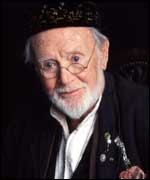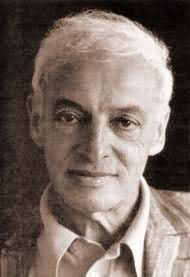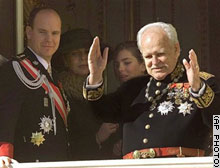
Sir John Mills

Sir John Mills, the celebrated British actor who portrayed war heroes, Dickensian upstarts and an extraordinary pantheon of English characters in a film, stage and television career that spanned much of the 20th century, died yesterday at his home in Denham, west of London. He was 97.
The cause of death was not announced, but The Associated Press quoted a trustee of Sir John's estate as saying he had been ill for about a month with a chest infection. He had been almost blind since 1992, when the retinas of his eyes failed, though he continued acting, appearing earlier this year as A Tramp in a short titled "Lights2."
In a career that spanned 70 years and included more than 100 films and scores of plays in London and New York, Sir John delivered touching, restrained performances that caught cherished notions of what it meant to be a Briton - self-effacing, decent, sentimental, even mawkish, but reliable, cool under fire, the ordinary seaman who pins down a German battleship, the schoolmaster-turned-R.A.F. pilot.
In films, he was the Cockney seaman in Noël Coward's classic "In Which We Serve" (1942), the sailor boy-next-door who goes to war in "This Happy Breed" (1944), the adult orphan Pip in David Lean's "Great Expectations" (1947), the compulsive disciplinarian commander of a Scottish regiment crushed by Alec Guinness's old-boy clique in "Tunes of Glory" (1960), and the Viceroy of India in "Gandhi" (1982).
On stage, Sir John, who began as a song-and-dance man in the 1920's, captivated London audiences with his first major hit as the American, George, in the 1939 production "Of Mice and Men." But he also performed Shakespeare and appeared in many West End plays, including three written by his wife, Mary Hayley Bell - "Men in Shadow" (1942), "Duet for Two Hands" (1945) and "The Uninvited Guest" (1953). He made his Broadway debut in 1961 as Lawrence of Arabia in Terence Rattigan's "Ross."
A small, wiry athletic man with intense gray eyes, wavy brown hair, a high forehead, an angular face and a resonant baritone voice, Sir John became one of Britain's most versatile, beloved and busy actors - and found time for tennis, skiing, swimming, polo and fast cars, which he called his lone vice.
He made forays to America for stage and television work, but resisted the lure of Hollywood, making his base and most of his films in England. "I love it here, and my wife and I wouldn't be happy anywhere else," he once explained. "So if I lived in Hollywood, I would simply be rich and unhappy. What's the point in that?"
He extolled honesty as a key to his craft, advising young actors to imagine the ways in which a character speaks and thinks, and then to act in accordance with those images. "He will be telling the truth and never overact or underact," Sir John said.
The recipient of many awards, including a prize at the 1960 International Film Festival in Venice, he won an Oscar as best supporting actor in 1971 for his portrayal of a village idiot in "Ryan's Daughter," for which he studied the behavior of brain-damaged patients for months. Queen Elizabeth II named him a Commander of the British Empire in 1960 and knighted him in 1976.
Sir John was the father of one of England's leading theatrical families, and appeared with both his daughters in films. He found several roles for Juliet Mills, the first when she was just a few weeks old, in "In Which We Serve," and he introduced Hayley Mills as the defiant girl in "Tiger Bay," taking the role of the police superintendent himself. A son, Jonathan, is a film scriptwriter.
Sir John was born Lewis Ernest Watts Mills on Feb. 22, 1908. His birthplace has been reported as Felixstowe, Suffolk, and as North Elmham, Norfolk. His father was a mathematics teacher and his grandfather a member of the London Corn Exchange, and while he was stagestruck he seemed destined for a career in business until he was 19, when he fled to the West End, determined to try his luck with a new first name, John.
He sold disinfectants and toilet paper to pay the rent, studied tap dancing and, in 1929, was cast in the chorus of a musical at the Hippodrome. A break soon developed. He joined a repertory company called The Quaints, and went on a yearlong tour in Asia, playing roles in dramas, comedies and musicals.
On tour, he met three people who were to be important to him - Aileen Raymond, a member of the troupe, whom he married in 1932 (they were divorced eight years later), Mary Hayley Bell, a 16-year-old girl in the audience in Tientsin who would become his second wife in 1941, and Noël Coward, who was impressed by his acting and became a lifelong friend.
Back in London, the young actor soon found parts in Coward's reviews and plays, including "Cavalcade" (1931), and in other productions. In 1938, he was invited to join the Old Vic Company and played Marlow in "She Stoops to Conquer," and Puck in "A Midsummer Night's Dream." After his 1939 West End success in John Steinbeck's "Of Mice and Men," he was offered the lead in Maxwell Anderson's "Key Largo" on Broadway. But World War II intervened.
He joined the Royal Engineers and later won a commission in the Royal Monmouthshire Rifles, but an ulcer ended his military career in 1942, and he returned to the London theater. As his stage career progressed, he turned increasingly to films, acting in four or five a year, so many that he sometimes lost count. His role in "Goodbye, Mr. Chips," brought him international stardom in 1939.
Many of his World War II movies were hailed by critics as gems of the genre, a mix of fine acting and patriotic themes. His heroes were not extraordinary men - citizen soldiers, seamen and airmen with boyish faces, the son or brother or boy next door who goes to war, is steady under fire and sometimes does not come home.
In Anthony Asquith's "Way to the Stars" (1945) he was a civilian schoolmaster who joins the R.A.F. In "Forever England" (1935) he was the able-bodied seaman confronting an enemy battleship, and in "Waterloo Road" (1945) he was a tormented soldier absent without leave. Sir John produced some films, including two comedies - "The Rocking Horse Winner" (1950), and "The History of Mr. Polly" (1949).
His later roles included the explorer Robert Falcon Scott in "Scott of the Antarctic" (1948), an inept sailor in "The Baby and the Battleship" (1956), Willie Mossop, a bootmaker clashing with his daughter, in "Hobson's Choice" (1954), Masterman Finsbury in "The Wrong Box" (1966), a submarine commander in "Above Us the Waves" (1955), Cpl. Tubby Bins in "Dunkirk" (1958) and General Kitchener in "Young Winston" (1972).
Sir John made his American television debut in 1956 in a production of Somerset Maugham's play "The Letter," and played a British officer in "The Interrogator," on NBC in 1962. His television work included a western series, "Dundee and the Culhane," in 1967, movie roles, many guest and comedic appearances and roles in "Tales of the Unexpected," in 1980.
In later years, there were other films and appearances, despite his failing eyesight. One of his last roles was a cameo - a man taking cocaine at a party in Stephen Fry's "Bright Young Things," in 2003.
Sir John, who is survived by Mary Hayley Bell and their three children, told David Frost in a 2002 interview that he would never retire. "It's something that I can hardly explain," he said. "It's such warmth that greets me, and I can even say the word love and I feel terrific. It's just wonderful."
Copyright 2005 The New York Times Company |



